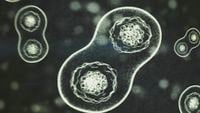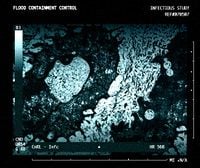Flood Super Cell: Difference between revisions
From Halopedia, the Halo wiki
m (→Biology) |
|||
| Line 4: | Line 4: | ||
==Biology== | ==Biology== | ||
[[File:Flood Cell Division.jpg|thumb|left | [[File:Flood Cell Division.jpg|thumb|left|Flood Super Cells performing [[Wikipedia:Cell division|Cell division]] inside of a host.]] | ||
The Flood Super Cell is often described as ''"thinking muscle"'', and closely resembles both neurons and glial cells in terms of its physical structure.<ref name="bestiarum"/> The Flood have demonstrated on numerous occasions that they have the ability to arrange these cells to mimic any organ that may be needed. In addition to this ability, the Flood Super Cell has a wide repertoire of additional abilities, which culminates in the creation of a Gravemind and a fully-developed Flood hive. | The Flood Super Cell is often described as ''"thinking muscle"'', and closely resembles both neurons and glial cells in terms of its physical structure.<ref name="bestiarum"/> The Flood have demonstrated on numerous occasions that they have the ability to arrange these cells to mimic any organ that may be needed. In addition to this ability, the Flood Super Cell has a wide repertoire of additional abilities, which culminates in the creation of a Gravemind and a fully-developed Flood hive. | ||
Revision as of 20:11, November 14, 2011
The LF.Xx.3273 Flood Super Cell, often referred to using the acronym FSC, is an undifferentiated cell type that serves as the basis of all Flood biomass.[1]
Biology

The Flood Super Cell is often described as "thinking muscle", and closely resembles both neurons and glial cells in terms of its physical structure.[1] The Flood have demonstrated on numerous occasions that they have the ability to arrange these cells to mimic any organ that may be needed. In addition to this ability, the Flood Super Cell has a wide repertoire of additional abilities, which culminates in the creation of a Gravemind and a fully-developed Flood hive.
An important capability essential to the Flood's survival is its ability to convert other life forms into more Flood cells, which can be used in a wide variety of ways. The Flood Super Cells capture and interface with the host's cells, which are quickly metabolized, broken down, analyzed, and reassembled into more Flood Cells that mirror the function of the target's cells.[2] This process is rapid and continuous, with the end result being that the host's biomass is largely overtaken by the newly-generated Flood biomass.[3]
When first inserted into a victim, primarily by the Infection Form, the Flood cells are in an encapsulated "spore" state before they become active in the victim.[4]
History
The Gravemind was the entity that communicated with the Forerunner AI 032 Mendicant Bias during the Forerunner-Flood War to convince it into rampancy and to turn it into a weapon against the Forerunners, using the Flood super cell to initiate communications. For a time, Mendicant Bias took faith in the Gravemind, believing the Forerunners were obstinate, unyielding, and blocking evolution's progress in the galaxy. However, after the firing of the Halo Array, Mendicant Bias realized how far he had fallen and denounced the Flood, pleading for the forgiveness of the Reclaimer in order to redeem his actions against his long-lost creators.
Trivia
- The Flood Super Cell shows remarkable similarities to the alien life form in the 1982 film The Thing. The cells of this alien being interfaces with and analyzes the cells of its victim, and simultaneously consumes them, shaping the resulting biomass to be a perfect replica of the victim. Similar to the Flood, the alien can reconstruct the matter of the victim in any way it chooses, and it is not something that can be cured, like a disease.
- The Flood Super Cell's ability to consume and facilitate the use of an organism as an environment for its own prosperity closely parellels the abilities of real world microorganisms, specifically those of the Agrobacterium genus. This genus of bacteria utilizes horizontal gene transfer, to insert harmful DNA into target plants, generating tumors that create an environment in which the bacteria can thrive in.
Sources
- ^ a b Bestiarum
- ^ Art of Halo 3, page 26
- ^ The Art of Halo: Creating a Virtual World, page 48
- ^ Halo: Combat Evolved, campaign level The Library
